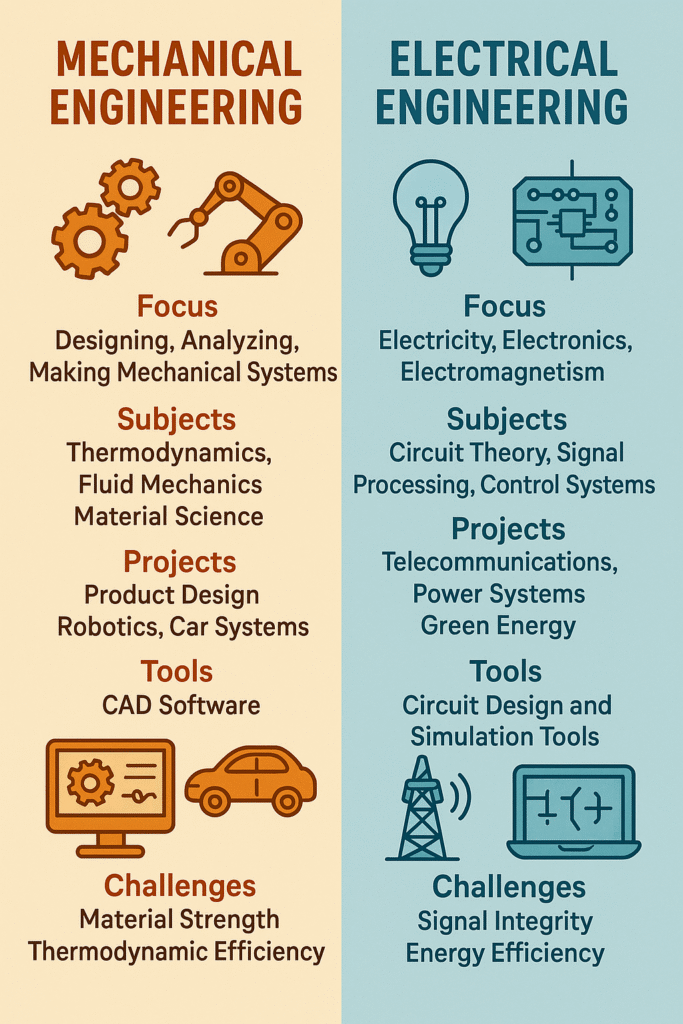As I explore engineering, I often think about mechanical vs electrical engineering. Both fields have their own challenges and rewards. They also offer different career paths that can shape my future.
It’s important to know the main differences between these fields. This knowledge helps me decide which one suits me best. I’ll look at what makes each field unique and why it’s key to consider my strengths and interests.
Introduction to Engineering Disciplines:
Engineering disciplines cover many fields, each adding its own special touch to our technology. When I look into engineering, I’m amazed by how mechanical and electrical engineering are different yet connected. These areas have grown from their beginnings and are key to new ideas and progress.
Engineers work to solve big problems, making sure systems run smoothly. They design machines in mechanical engineering and complex circuits in electrical engineering. Their work changes our world. Seeing how these fields work together shows their importance in making new discoveries and improving many industries.
Understanding Mechanical Engineering:
Mechanical engineering is a wide and flexible field in engineering. It covers mechanics, dynamics, thermodynamics, and materials science. This lets me design and analyze systems that deal with motion, heat, and energy. My experience in mechanical engineering shows it’s key for creating many technologies and processes in different industries.
Being a mechanical engineer means being good at solving problems, being creative, and thinking analytically. These skills help us face tough challenges in areas like aerospace, automotive, and manufacturing. Working with big names like Boeing and General Motors has given me insights into how mechanical engineering makes new things possible.
Mechanical engineering is always changing, needing a deep understanding of basics and the ability to keep up with new tech. As I learn more, I see how important it is and the big role mechanical engineers have in shaping the future of many fields.
Understanding Electrical Engineering:
Electrical engineering deals with electricity, electronics, and electromagnetism. It’s fascinating because it shapes our modern world. The main areas include power systems, telecommunications, and control systems.
These fields are key to our daily lives. They affect how we talk to each other and use power.
Electrical engineers mix analytical thinking with creativity. They design and develop systems and technologies. Companies like Siemens and General Electric show the field’s importance.
These companies’ work powers industries and enhances our lives. This highlights electrical engineering’s role in our world.
Mechanical vs Electrical Engineering: Key Differences:
Mechanical and electrical engineering are two distinct fields within engineering. Mechanical engineering deals with designing, analyzing, and making mechanical systems. Electrical engineering, on the other hand, focuses on electricity, electronics, and electromagnetism. This difference is key to understanding their roles.
Students of mechanical engineering study thermodynamics, fluid mechanics, and material science. Electrical engineering students learn about circuit theory, signal processing, and control systems. These different subjects lead to different ways of working on projects.
Mechanical engineers often work on designing products, robotics, and car systems. Electrical engineers, by contrast, are key in telecommunications, power systems, and green energy. The tools they use also differ, with mechanical engineers using CAD software and electrical engineers using simulation and circuit design tools.
Each field faces unique challenges. Mechanical engineers deal with material strength and thermodynamic efficiency. Electrical engineers face issues in signal integrity and energy efficiency. These differences shape the impact each field has on technology and innovation.

Skills Required for Mechanical Engineers:
In mechanical engineering, certain skills are key to success. Problem-solving is vital for overcoming complex design and manufacturing hurdles. Analytical thinking helps in evaluating designs and improving system efficiency.
Being good with CAD software is also important. It’s used to create accurate models and simulations. This skill is essential for precise work.
Teamwork and clear communication are also critical. Working with others from different fields is common. Good communication leads to better teamwork and results.
These skills are seen in real-world projects. For example, in making advanced robotics or sustainable energy systems. Successful teamwork leads to new and innovative solutions.
Skills Required for Electrical Engineers:
Electrical engineers need a wide range of skills to succeed. Being good at circuit design is key. It’s about creating and analyzing electrical circuits, which is the base of many projects.
Knowing programming languages like Python and C++ helps a lot. It lets me design and test electrical systems better.
Keeping up with new technologies is also vital. Areas like renewable energy and the Internet of Things (IoT) change fast. I make sure to keep learning to stay ahead.
Working on real projects helps me use my skills in real situations. This way, I can tackle current problems and prepare for new ones.
Being able to solve problems is another important skill. Working with different teams also broadens my knowledge. It shows how electrical systems work with other engineering areas.
This teamwork boosts my skills and gets me ready for various engineering tasks.
Mechanical Engineers vs Electrical Engineers: Career Paths:
Exploring career paths in mechanical engineering shows many interesting roles. These include design engineers and research and development specialists. They work with mechanics, thermodynamics, and materials science.
As a mechanical engineer, I enjoy project management. It lets me oversee complex projects and push technology forward.
Electrical engineering offers paths in fields like renewable energy and robotics. Electrical engineers design, test, and implement electrical systems. They can work as systems engineers or circuit design engineers, using their skills to innovate.
Both fields have strong job prospects. Industries like aerospace, automotive, and energy need skilled engineers. A bachelor’s degree is usually required, but advanced degrees can help advance your career.
Choosing between mechanical and electrical engineering depends on your interests and strengths. Each path has its own challenges and rewards.
Mechanical Engineering vs Electrical Engineering: Which Career Suits You Best?
Choosing between mechanical and electrical engineering is a big decision. It’s important to think about what you enjoy doing. Do you like working with physical systems or electrical circuits? Knowing this can help you decide which career is right for you.
Long-term goals are also key. Think about the work environment you prefer. Do you like hands-on work or managing projects? Answering these questions can help you choose the right engineering field for your goals.
Self-assessment quizzes can also help. They show your strengths and weaknesses in both fields. This can help you see where your skills fit best and make a choice.
The Teamwork of Mechanical and Electrical Engineering:
In engineering, success often depends on teamwork. Mechanical and electrical engineers working together is key in today’s complex projects. They use their different skills to solve problems that one person can’t handle alone.
Think about projects like robotics and renewable energy systems. Mechanical engineers create the structure and mechanisms. Electrical engineers handle the control systems and energy use. This teamwork boosts innovation and efficiency.
When mechanical and electrical engineers work together, amazing things happen. They share ideas and respect each other’s views. This leads to better engineering solutions as technology keeps getting better.
Salary Comparisons: Who Earns More?
Looking at mechanical vs electrical engineering salaries, both fields pay well. New mechanical engineers make $65,000 to $75,000 a year. Electrical engineers start at $70,000 to $80,000. This difference might be because electrical engineers are in demand in tech.
As engineers get more experience, their pay goes up. Experienced mechanical engineers can earn over $90,000. Electrical engineers with years of experience can make more than $100,000. Where you work also affects your salary, with big cities like San Francisco and New York City paying more.
What industry you work in also affects your salary. Jobs in renewable energy and automation are growing fast, leading to higher pay for engineers. Getting special certifications can also increase your earnings. Both engineering paths offer strong financial opportunities.
Pressure and Workload: Mechanical vs Electrical Engineering:
Exploring engineering fields, I found that mechanical and electrical engineering have unique pressures and workloads. The pressure in mechanical vs electrical engineering varies based on job duties and project needs. Mechanical engineers often deal with tight deadlines due to the physical creation of products.
This can lead to intense work periods, mainly during product development. Electrical engineering, on the other hand, focuses on precision and complex theories. The pressure here is about keeping up with tech advancements and ensuring systems work under different conditions.
It requires a lot of research and development, adding to its challenges. Studies show how engineers in both fields manage their workloads. They find ways to balance stress and deliver innovative solutions.
The pressures in mechanical and electrical engineering affect daily tasks and career happiness. Each field needs a specific way to handle workload. Knowing these differences helps in making better career choices.
Which Engineering Branch is Right for You?
Choosing an engineering branch can be tough, like picking between mechanical and electrical engineering. Each field has its own chances and hurdles. It’s important to think about what you like and what you’re good at.
Do you like working with machines or circuits? Knowing your interests helps a lot. It’s a big part of deciding which branch is right for you.
Doing your homework is key. Look at what each branch teaches. See which subjects you find most interesting. Going to workshops or seminars can give you real insights.
Talking to professionals through internships or volunteering is also helpful. It lets you see what each field is like up close. This can really help you decide.
Figuring out your passion means thinking about your future. Imagine the kind of work you want to do. Think about the projects you’d like to work on. This will help you see if mechanical or electrical engineering is the right fit for you.
Conclusion:
Reflecting on mechanical engineering vs electrical engineering, both fields are rewarding. They offer unique career paths. Understanding their differences helps me choose wisely, aligning with my interests and strengths.
Continuous learning and adaptability are key in the tech world. Whether I choose mechanical or electrical engineering, staying proactive in my career will make me stand out. This is important for success in the job market.
My choice today will define my career path. Weighing the pros and cons of each field is essential. This way, I can follow my passions and contribute to society’s progress. Embracing change and seeking growth will keep me valuable in this fast-paced field.
FAQ:
Q: Mechanical engineering vs electrical engineering: which should I choose?
A: Choosing between mechanical and electrical engineering depends on your interests and strengths. Mechanical engineering deals with physical systems. Electrical engineering focuses on electrical systems. Think about what you find most exciting and explore both fields before deciding.
Q: What career paths are available for mechanical engineers?
A: Mechanical engineers have many career paths. They can work in aerospace, automotive, manufacturing, and robotics. Roles like design engineers, research engineers, and project managers are common. This offers a wide range of opportunities.
Q: What are the most critical skills needed for electrical engineers?
A: Electrical engineers need skills like circuit design and programming. They must also know simulation software and emerging technologies like renewable energy and IoT. Strong analytical and problem-solving skills are also key.
Q: Who earns more: mechanical engineers or electrical engineers?
A: Electrical engineers usually earn more than mechanical engineers, mainly in fields like telecommunications and power systems. But, salaries can change based on experience, location, and industry.
Q: How do teamwork dynamics differ between mechanical and electrical engineers?
A: Both types of engineers work together on projects like robotics and renewable energy. Mechanical engineers focus on physical parts, while electrical engineers work on electronic systems. Good communication is important for success.
Q: Mechanical vs Electrical Engineering: Which Engineering discipline Has Faced More Pressure?
A: Work pressure can differ based on the job and project, not just the discipline. Both mechanical and electrical engineers face tight deadlines and high stakes. It’s important to understand the specific job demands in each field.
Q: What factors should I consider when choosing between mechanical and electrical engineering?
A: Think about your interests, strengths, and career goals when choosing. Consider the projects you find exciting. Try internships or volunteer work in both fields to get a feel for them.
Q: How do mechanical and electrical engineering contribute to technological advancements?
A: Mechanical and electrical engineers are key to innovation. Mechanical engineers improve physical systems and processes. Electrical engineers advance electronics and power systems. Together, they drive progress in many industries.


Wow I had a great time reading through as a mechanical engineer